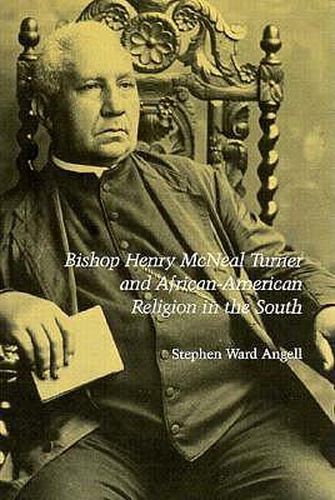Readings Newsletter
Become a Readings Member to make your shopping experience even easier.
Sign in or sign up for free!
You’re not far away from qualifying for FREE standard shipping within Australia
You’ve qualified for FREE standard shipping within Australia
The cart is loading…






Henry McNeal Turner was an epoch-making man, as his colleague Reverdy Ransom called him. A bishop in the African Methodist Episcopal Church from 1880 to 1915, Turner was also a politician and Georgia legislator during Reconstruction, U.S. Army chaplain, newspaper editor, prohibition advocate, civil rights and back-to-Africa activist, African missionary, and early proponent of black theology. This richly detailed book, the first full-length critical biography of Turner, firmly places him alongside DuBois and Washington as a preeminent visionary of the postbellum African-American experience. The strength and vitality of today’s black church tradition owes much to the herculean labors of pioneers such as Turner, one of the most skillful denominational builders in American history. When emancipation created the prerequisites for a strong national religious organization, Turner, with his boldness, charisma, political wisdom, eloquence, and energy, took full advantage of the opportunity. Combining evangelicalism with forthright agitation for racial freedom, he instigated the most momentous transformation in A.M.E. Church history–the mission to the South. Stephen Angell views Turner’s advocacy of ordination for women and his missionary work in Africa as a further outgrowth of the bishop’s deep evangelical commitment. The book’s epilogue offers the first serious analysis of Turner’s theology and his replies to racist distortions of the Christian message.
$9.00 standard shipping within Australia
FREE standard shipping within Australia for orders over $100.00
Express & International shipping calculated at checkout
Henry McNeal Turner was an epoch-making man, as his colleague Reverdy Ransom called him. A bishop in the African Methodist Episcopal Church from 1880 to 1915, Turner was also a politician and Georgia legislator during Reconstruction, U.S. Army chaplain, newspaper editor, prohibition advocate, civil rights and back-to-Africa activist, African missionary, and early proponent of black theology. This richly detailed book, the first full-length critical biography of Turner, firmly places him alongside DuBois and Washington as a preeminent visionary of the postbellum African-American experience. The strength and vitality of today’s black church tradition owes much to the herculean labors of pioneers such as Turner, one of the most skillful denominational builders in American history. When emancipation created the prerequisites for a strong national religious organization, Turner, with his boldness, charisma, political wisdom, eloquence, and energy, took full advantage of the opportunity. Combining evangelicalism with forthright agitation for racial freedom, he instigated the most momentous transformation in A.M.E. Church history–the mission to the South. Stephen Angell views Turner’s advocacy of ordination for women and his missionary work in Africa as a further outgrowth of the bishop’s deep evangelical commitment. The book’s epilogue offers the first serious analysis of Turner’s theology and his replies to racist distortions of the Christian message.